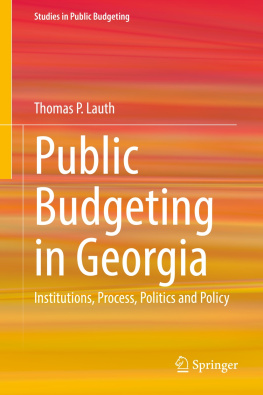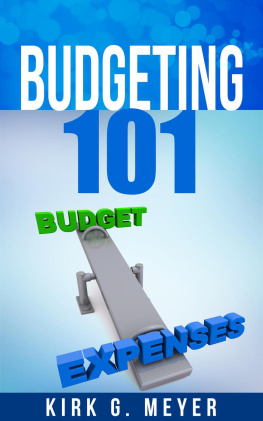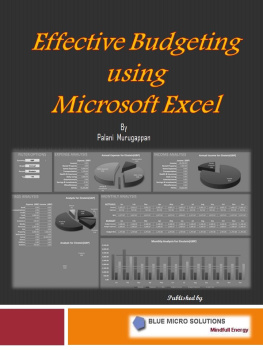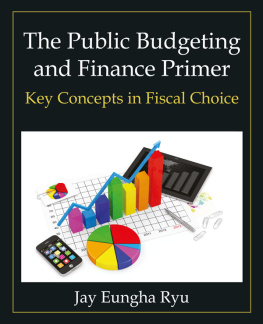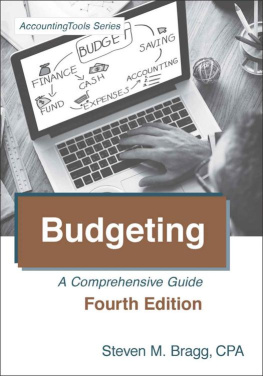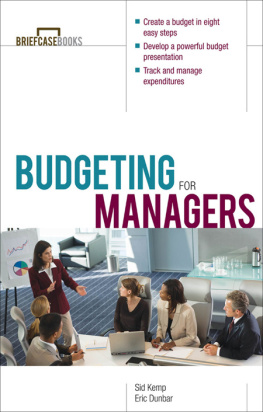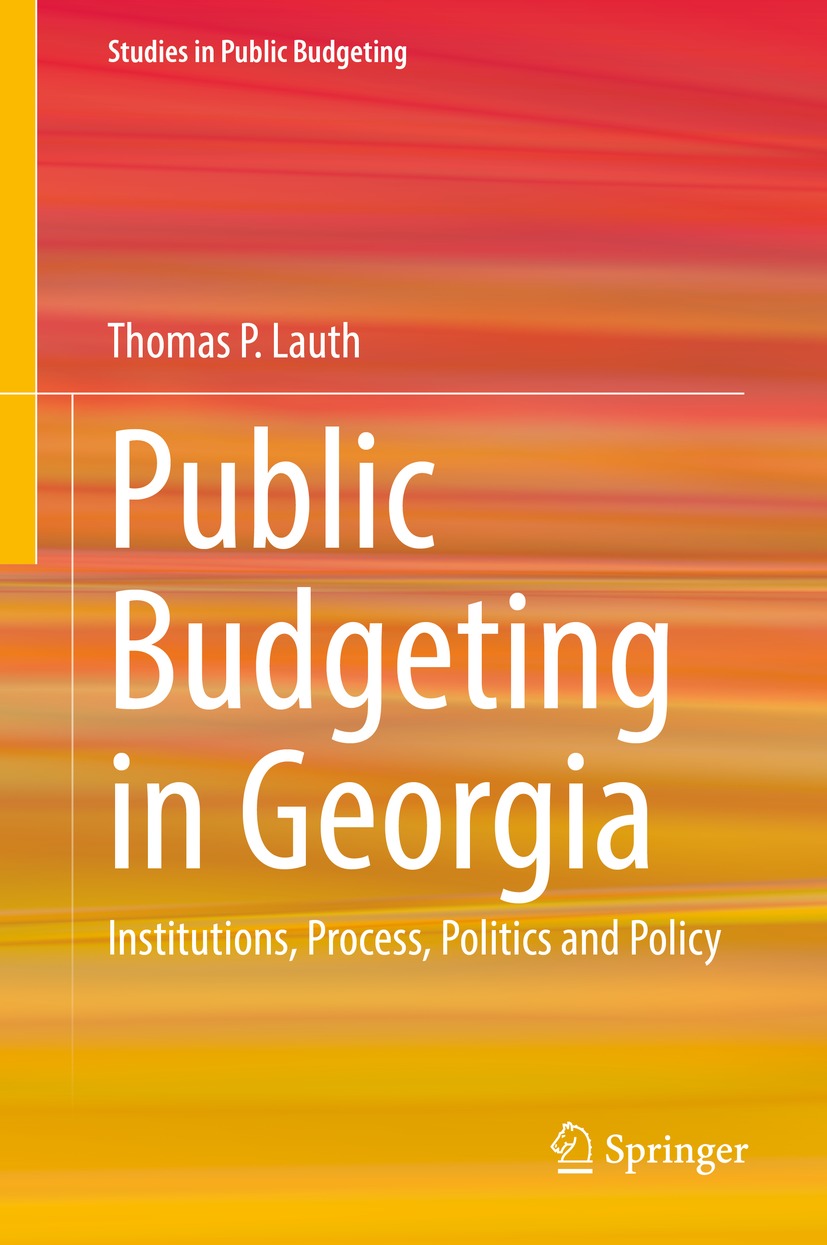Thomas P. Lauth
School of Public and International Affairs, University of Georgia, Athens, GA, USA
Studies in Public Budgeting
ISBN 978-3-030-76022-9 e-ISBN 978-3-030-76023-6
https://doi.org/10.1007/978-3-030-76023-6
The Editor(s) (if applicable) and The Author(s), under exclusive license to Springer Nature Switzerland AG 2021
This work is subject to copyright. All rights are solely and exclusively licensed by the Publisher, whether the whole or part of the material is concerned, specifically the rights of translation, reprinting, reuse of illustrations, recitation, broadcasting, reproduction on microfilms or in any other physical way, and transmission or information storage and retrieval, electronic adaptation, computer software, or by similar or dissimilar methodology now known or hereafter developed.
The use of general descriptive names, registered names, trademarks, service marks, etc. in this publication does not imply, even in the absence of a specific statement, that such names are exempt from the relevant protective laws and regulations and therefore free for general use.
The publisher, the authors and the editors are safe to assume that the advice and information in this book are believed to be true and accurate at the date of publication. Neither the publisher nor the authors or the editors give a warranty, expressed or implied, with respect to the material contained herein or for any errors or omissions that may have been made. The publisher remains neutral with regard to jurisdictional claims in published maps and institutional affiliations.
This Springer imprint is published by the registered company Springer Nature Switzerland AG
The registered company address is: Gewerbestrasse 11, 6330 Cham, Switzerland
Series Editors Preface
Though the earliest rudimentary budget and budgeting practices can be traced to ancient civilizations, modern government budget and public budgeting developed more recently in human history. From the perspective of high politics, The Bill of Rights (1689, Britain) made it possible, for the first time, for a legislative body to exert control over the outlays of a monarch, adopt a tax system, and pass tax laws. Without explicit legislative approval, the King could neither tax nor spend. It took another century, until 1789, to translate that political possibility of legislative control over the purse into administrative reality. That was the beginning of the official budget document. Several more decades passed before it became an annual routine for the finance minister to propose government revenues and expenditures for approval by the legislature. A treasury accounting department, responsible to the legislature, was established to supervise this process and ensure that government outlays were made in accordance with appropriations.
Therefore, when the Founding Fathers of the United States created the new republic in the 1780s, they had no system on which to model budgetary affairs. As a result, they left the fundamental laws taciturn on these issues. The Congress dominated fiscal affairs, with no formal role for the President. In this fashion, the nation muddled along until the early twentieth century, when the US economy was already humming to the top of the world but its fiscal house was in disarray. Roaring industrialization and rising urbanization demanded more and better public programs. In response, the US government assumed increasing responsibilities and exercised unprecedented regulation of the economy, but with inadequate efforts at systematically rationalizing its activities.
Public intellectuals keenly realized that tax reforms alone were far from sufficient. Responsible fiscal governance also necessitated expert review of appropriation proposals and enhanced executive authority in budgetary affairs. While seeking inspiration, European budget practices caught their attention. In 1912, President Tafts Commission on Economy and Efficiency formally recommended to Congress The Need for a National Budget. These efforts produced the Executive Budget of modern government and the public budgeting procedures for accountable and responsible governance.
This new tool of democratic governance was immediately put to the test first in large municipalities, then in the states. The leading progressivists believed that government could be run like big corporations if private companies can do something well, there is no reason the government cannot. Economy and efficiency were the lodestar. The Public Budgeting Movement culminated at the federal level with the enactment of the Budget and Accounting Act of 1921, which was signed into law by President Warren Harding on June 10 of the same year. In December, the countrys first federal Executive Budget, for fiscal year 1923, was transmitted to Congress for approval. Thus began a new era.
A century has passed since the enactment of the Budget and Accounting Act. A centennial is an occasion for celebration; but more importantly, it is a time to reflect on the budgetary successes and failures that have occurred. Overall, the countrys budget system worked well for decades, at least until the late 1960s. Though it is presumptuous to credit the budget system with all the successes of the prior four decades, it is fair to say that the system helped guarantee smooth and effective governance. On the other hand, the vicissitudes of budgetary missteps since the 1970s highlight increasing urgency for a comprehensive reexamination of the design, especially the rules and mechanisms of the existing budget system.
In a figurative sense, reinventing the tool for democratic governance and efficient administration is a continuous process. At any single point in time, a budget and its formulating process may look static, with seemingly chaotic threads. However, under an evolutionary lens, patterns will emerge. Each generation of practitioners and researchers is uniquely situated to continue reinventing these vital governance tools. The formation of budget and budgeting will remain in an evolutionary mode. Our task is to discern the latent long-run patterns, to extract rules from the patterns, and to formulate principles that will guide future administrations toward better outcomes. This Studies in Public Budgeting series is designed to serve this purpose.
We identified and invited expert policymakers and distinguished scholars to contribute the volumes in this series. Each author has paid decades of devoted attention to the practice or study of budgeting; each volume in the series contributes a unique perspective on the core issues.
As the series editor, I express heartfelt thanks to Springer International for its dedication and support in this Herculean effort.
Yilin Hou
Syracuse, NY, USA
February 2021

